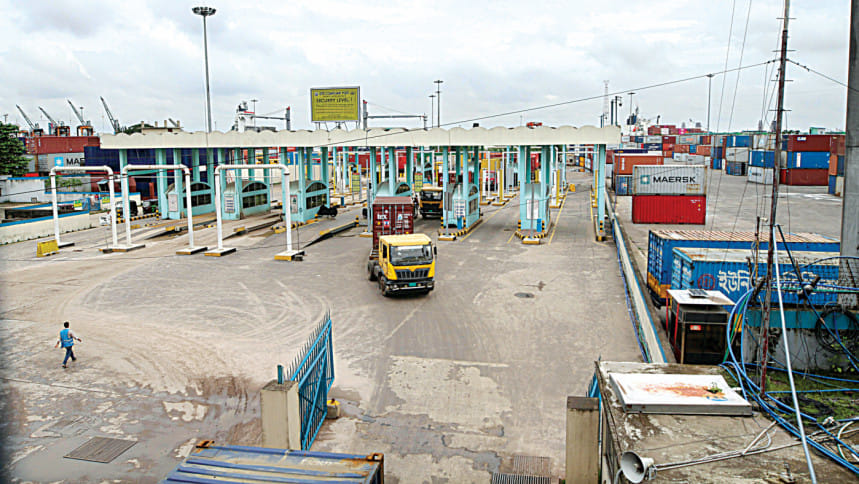No time to spare in stabilising economy: experts

Bangladesh has no time to spare when it comes to ensuring the stability of the economy, which has fallen into a crisis mainly due to the absence of democracy for over a decade.
Following Sheikh Hasina's resignation as prime minister and the announcement that an interim government would be formed, economists yesterday said reforms should be taken immediately to address economic challenges.
The challenges include high inflation, falling foreign exchange reserves, the high burden of default loans, poor governance in the banking sector and, above all, corruption.
The government must also stem further destruction before taking steps to revive the economy.
It is unclear what type of government is going to be formed now, but there is no time to spare when it comes to reviving the economy, said Zahid Hussain, a former lead economist of the World Bank's Dhaka office.
The economy was already in crisis and the recent political turmoil, which included internet blackouts and supply chain disruptions, only rubbed salt in its wounds.
So, the priority now should be the economy, he said.
To bring back normality, social equity and justice need to be ensured, which also aligns with the students' demands.
Internet connection and other communications should not be disrupted further while education should be resumed with full priority, Hussain said, adding that such measures would provide confidence to people and normalise economic activity.
Due to the turmoil over the recent weeks, which included the deaths of over 300 people including students, there was supply chain disruption.
Now, everything should be operational. The metro rail and elevated expressway in Dhaka as well as railways and all other connections should be operational as soon as possible, he said.
In order to rein in inflation, the supply chain disruption should be addressed and money should not be printed, the economist added.
Budgetary reforms are also necessary, according to Hussain. The interim government must examine areas where it can save as well as where it needs to increase expenditure.
As poor people are suffering, the government should take measures to increase support for them.
He also said all barriers in making the foreign exchange market transparent and market-based will have to be removed.
Eradication of corruption should be prioritised and all the regulatory bodies should be reformed, he added.
According to Ahsan H Mansur, executive director of the Policy Research Institute of Bangladesh, if the political system is inadequate, the economy cannot perform well. So, he said, a participatory and democratic political system is necessary.
Democracy and accountability should be ensured as well.
He added that the country is facing several short-term challenges as well as structural problems.
Due to stubbornly high inflation, low-income individuals have been suffering.
Annual inflation rose to 9.73 percent in 2023-24, which was the highest rate in the past 12 years. The inflation rate has remained above 9 percent since March of 2023, according to the Bangladesh Bureau of Statistics (BBS).
Alongside attempting to stabilise exchange rates, the interim government will also have to focus on reducing expenditure in order to tame inflation, Mansur said.
To solve structural problems in the financial sector, a committee of analysts must be tasked with unearthing problems in the banking sector and finding out exactly how big the hole is.
If a proper diagnosis is not conducted, the problem cannot be solved, he added.
Other areas like the stock market, bond market and insurance industry should also be analysed by a separate committee and restructured if necessary, he recommended.
The International Monetary Fund and World Bank can provide support in these areas if necessary.
He also said the existing revenue management system has been a silent killer, adding: "It is destroying the whole economy."
An economy cannot develop with a low tax-GDP ratio and Bangladesh has one of the lowest in the world.
In FY23, Bangladesh's tax-to-GDP ratio stood at 7.3 percent despite rising per capita income, according to the Ministry of Finance.
So, the whole system should be reformed to raise tax revenues, he said.
Along with financial support, empowering local government agencies is also necessary as it will help decentralise the economy and development, Mansur added.
Fahmida Khatun, executive director of the Centre for Policy Dialogue (CPD), said the economy needs huge reforms, adding that it had been weakened by a lack of political will.
Bangladesh has been following the wrong political system of non-democracy for more than a decade. When a political system is devoid of democracy, one group benefits and rent-seeking prevails.
So, the country's people suffer despite higher GDP growth because proper distribution is absent, she said.
At the same time, institutions such as the Bangladesh Bank, National Board of Revenue and Bangladesh Securities and Exchange Commission suffered from a lack of good governance due to non-democratic practices.
"Their governance broke down. Moreover, unabated corruption soared and people suffered," Fahmida said.
She added that there had been huge corruption in implementing development projects, which wasted taxpayers' money.
At the same time, investment slowed down, job creation faltered, exports declined, and the foreign exchange reserves went down.
The non-democratic system is at the root of the volatile economic situation at present. Now, the structure of the economy should be reformed to bring back vibrancy, Fahmida added.

 For all latest news, follow The Daily Star's Google News channel.
For all latest news, follow The Daily Star's Google News channel. 


Comments